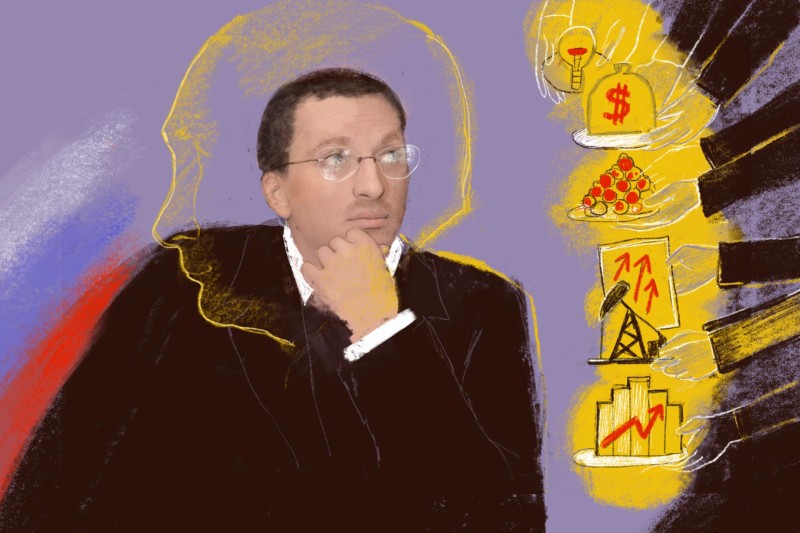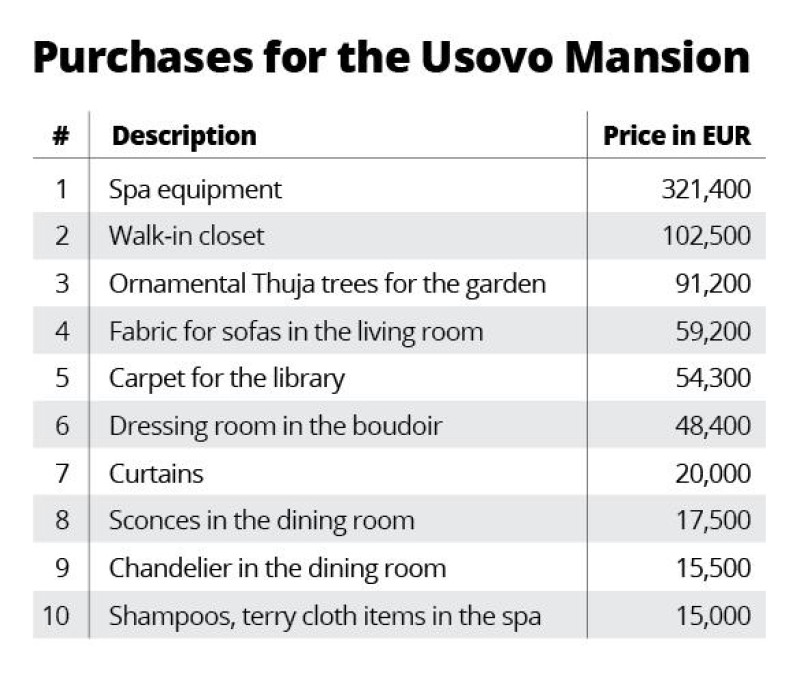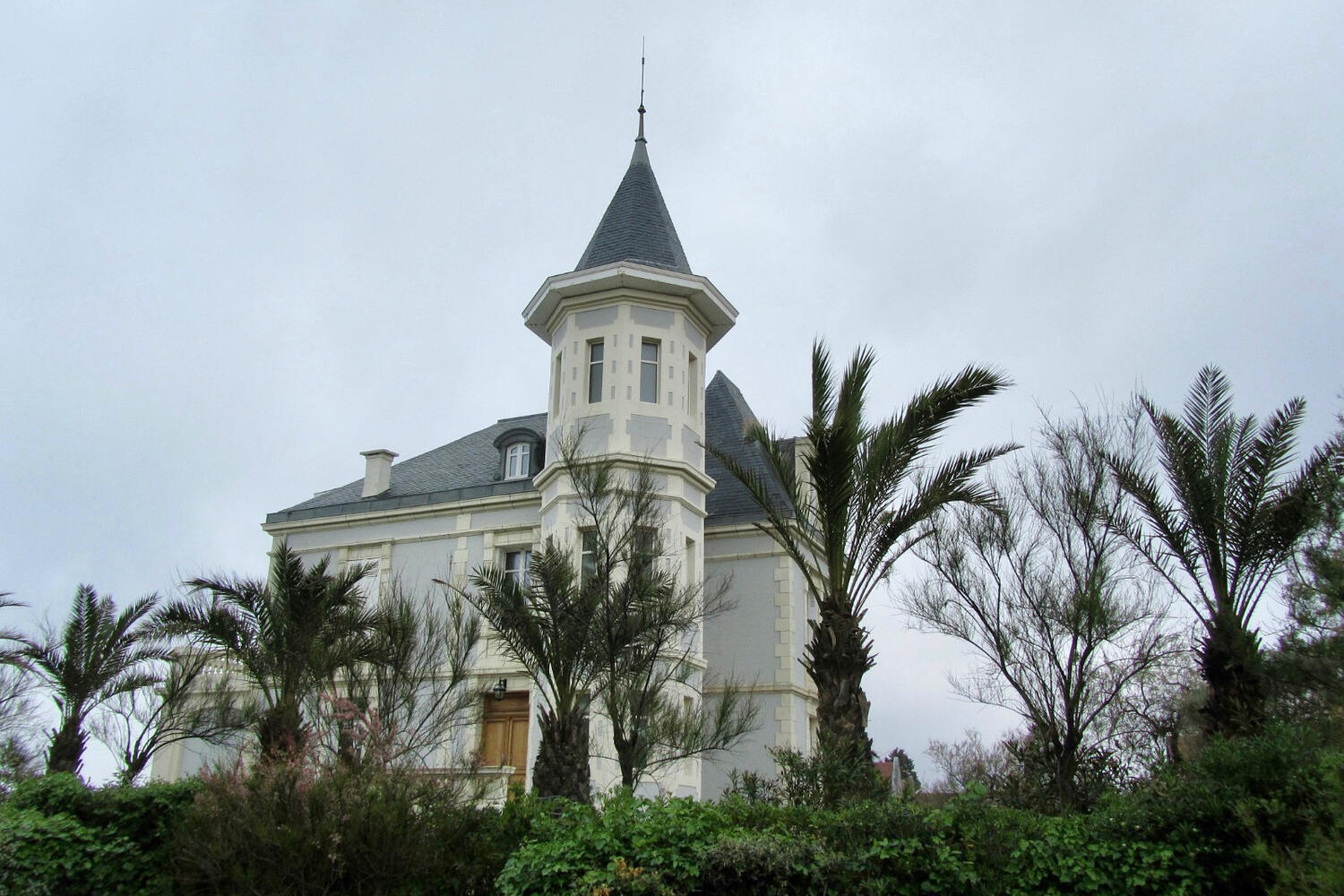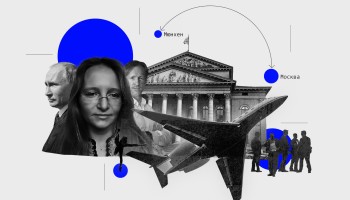In Russia, few secrets are guarded as jealously as basic information about President Vladimir Putin’s family.
The president’s official biography confirms the widely-known fact that he and his former wife had two daughters, Maria and Katerina. But neither Putin nor his press service have ever revealed his daughters’ full names or anything about their family lives or careers. Neither uses his surname in public.
Among the few facts that have been pieced together by journalists is that Putin’s younger daughter, Katerina, was once married to a man named Kirill Shamalov. It is clear that Shamalov is a wealthy man, having become Russia’s youngest billionaire at just 32 years old. But he is not a household name, and few details about his fantastic acquisition of wealth have been reported.
Now, for the first time, a wider set of facts about Shamalov has become available. Earlier this year, reporters from IStories, OCCRP’s Russian member center, gained access to a leaked archive of Shamalov's emails from an anonymous source.
The leak contains more than 10,000 messages spanning the years 2003 to 2020, and it offers unprecedented insight into a man who has rare access to the inner workings of Russian political life.
Collection Number One
The anonymous source didn’t reveal how he or she obtained Shamalov’s emails — but the messages themselves hint at a possible answer.
Publishing leaks from anonymous sources is a difficult journalistic decision.
In the first place, the authenticity of documents received from an unknown party may be in question. To verify the Shamalov archive, the emails were first structured and indexed by OCCRP’s data analysts. Reporters from IStories then spent nearly a year verifying them: They checked email headers, spoke with senders, and substantiated information in company registries, real estate databases, social networks, and other publicly available sources. Our conclusion is that the emails are real.
Another issue is privacy. When granting access to the material, the source requested that reporters not publish any medical records. This request has been honored. IStories and OCCRP have also chosen not to release the archive indiscriminately. What’s being used in this investigation is just enough to tell a story that’s in the public interest.
Beyond confirming without a doubt that Shamalov married Putin’s daughter Katerina, who uses the surname Tikhonova, the archive contains a number of other revelations about the financial advantages he gained, and the influence he enjoyed, through his access to the first family. His evident ability to wield administrative resources and personal connections to the financial benefit of himself and his friends and business partners exemplifies the corrupt nexus of power and business that characterizes modern Russia.
Kirill Shamalov and Katerina Tikhonova both declined to comment for this story. Vladimir Putin’s spokesman, Dmitry Peskov, replied in one sentence: “We’ve already left such questions without answers many times.”
The Elder Shamalov
Kirill Shamalov is the son of Nikolai Shamalov, one of Putin’s oldest and closest friends.
“New Piterskie”
Many members of Russia’s ruling elite are old Putin associates who followed him to Moscow and took up key government posts after he rose to the presidency.
These dacha neighbors, judo sparring partners, massage therapists, and one-time city bureaucrats are sometimes called Piterskie after their hometown of St. Petersburg — a term that, by analogy to other geographical epithets like the Tambovskie or Izmailovskie, carries more than a whiff of organized crime.
Many of these men are still around. But over the two decades since Putin took office, their children and grandchildren have amassed their own wealth and power and have begun to rise into top positions. Call them the “new Piterskie.”
Shamalov’s email archive offers a curious portrait of this group. Many of them, like him, studied law at St. Petersburg State University. They discuss taking positions in government, state firms, and big business, and note that when they come to Moscow, the city will be a different one than their parents once conquered.
But some things never change. As in their parents’ world, personal connections mean everything for the new Piterskie.
In June 2004, when Shamalov was in his final year of studies, he received an email from a classmate, Yan Piskunov:
Buddy, we’ll arrange everything in the best way possible! It’ll be sweet. The main thing is to discuss the organization. I’ll send you the speech on Tuesday morning. I’ll pick up the review today or Monday, and during the week we’ll prepare answers to the reviewers’ questions and comments. I was very glad to finally see you. Get some rest and take your time.”
Judging from the context, the message is about helping Shamalov prepare his thesis defense — and handing him a pre-written speech to present before the examination committee.
A few days later, the presentation was ready.
“Hello Shamalov :)!,” Piskunov writes again. “Draft speech ... attached.” And indeed, the attached file contained a presentation about a thesis on real estate law.
The cheerful Piskunov had a career ahead of him that would be the envy of any Russian student. Not long after he graduated, at age 25, he vaulted into an executive position at Gazprom-Media, the largest media holding in the country, becoming its deputy general director and head of the legal department.
The group, which includes such popular outlets as the NTV and TNT television channels and the Echo of Moscow radio station, belongs to Gazprombank. By coincidence or not, Shamalov's older brother, Yuri, is on the board of directors of both the media holding and the bank. He did not respond to requests for comment.
In September 2009, Piskunov came up in Shamalov’s correspondence again when an acquaintance wrote him with an unusual, but extremely frank, request: “Question: is it possible to change the position of Piskunov and Pleshkov towards Vnukovo airport, or to neutralize their activities?”
A memo attached to the email provided the relevant context: Two of Moscow’s major airports, Vnukovo and Domodedovo, had been involved in a commercial dispute that had been resolved in Domodedovo’s favor, costing Vnukovo some 350 million rubles ($11.8 million). According to the writer, the courts had made the ruling “under pressure” from Dmitry Pleshkov, then the “Head of the Secretariat of the Chairman of the Supreme Arbitration Court,” who himself allegedly acted “on behalf of Yan Borisovich Piskunov ... of Gazprom-Media.” He was asking whether these two men could be influenced in a way that would favor Vnukovo airport.
There’s no evidence that Shamalov made any requests to either Piskunov or Pleshkov to intervene in the airport dispute. But a month later, the Federal Arbitration Court of the Moscow District overturned the earlier court decision, saving Vnukovo millions. Exactly what Shamalov's acquaintance asked for had happened.
Shamalov was only 27 that year, but he already had an impressive resume, having worked for Gazprom, Gazprombank, the Russian government, and Rosoboronexport, the country’s top arms exporter. He was now Vice President for Administrative Business Support at Sibur, Russia's largest petrochemical company.
But much bigger things were to come.
In 2013, as several outlets including Reuters reported, Shamalov married a woman named Katerina Tikhonova who was described as Putin’s daughter.
The Kremlin has refused to confirm that this is the case. But Shamalov's emails leave no doubt, and confirm Tikhonova and Shamalov were married in February 2013. They don’t reveal when the couple got acquainted. But the evidence — including this message he received from one of the organizers of their wedding — indicates that he has known her for most of his life:
Kirill, Katerina,
During the Ice Show, a screen will be installed behind the stage to show a video sequence to accompany the performances on the ice, and during some numbers a live broadcast will be organized to show what’s happening on stage (for example, during your dance).
For the video sequence, we need:
Your joint photos from 2012-2013 ("recent")
Childhood photos — separately, together ...
Text from messages, from both Katerina and Kirill ... just the text, it’d be nice to have something recognizable ... how you addressed each other ...
Kirill, a photo in military uniform? Maybe with friends, or taking your oath, there’s probably something ...
Kirill — what was your phone number in 2003/2004 - when you called Katerina?
Katerina, we would like to have some video clips of your performances? Perhaps there are some from that iconic world championship in Munich, when Kirill spent 11 hours with you? Or whatever you’re willing to show (I remember that there are competitors among the guests)
By the summer before their wedding, the couple was busy arranging a luxurious life in Russia and France. On June 2, 2012, Shamalov received an email from the woman who was in charge of rebuilding and decorating a house for the young couple in Usovo, a village in an elite area near Moscow not far from the president’s Novo-Ogarevo residence:
Dear Kirill, here are the photos of items that Katya has chosen for your garden. Everything is in stock in Italy (we received confirmation). To get this order moving, you must make an advance payment of 60% of the indicated amount.
Attached to the email was a list of purchases for a small outdoor tent — a table, a sofa, a couple of armchairs, a fabric curtain — that cost 53,000 euros.
Shamalov forwarded this to his future wife: “I like it, no objections. What’s your opinion?”
Two days later, Tikhonova sent Shamalov a list of Japanese books for their home library that cost over $7,700. More expensive still was a carpet for the library that the couple purchased for 54,300 euros.
Shamalov received frequent reports on the progress of the house thanks to which it is possible to estimate its total cost. The renovation, furniture, and equipment came to nearly 8 million euros. Adding the estimated cost of the land and the house itself brings the possible total price of the mansion to about 15-17 million euros.
But the house in Usovo was not the couple’s only expensive property.
In October 2012, through a Monaco company called Alta Mira, Shamalov bought a mansion in the French resort town of Biarritz from the family of Gennady Timchenko, a longtime Putin friend and a multi-billionaire with interests in energy, transport and infrastructure. Judging by documents in Shamalov's emails, the Biarritz mansion cost 4.5 million euros.
The decoration of this house, too, spoke of the couple’s expensive tastes. In July 2014, a designer asked Shamalov to approve the purchase of 19,000 euros’ worth of terrace and garden furniture. He forwarded this message to Tikhonova, who replied two days later: “This isn’t how it’s done. Tell her to send pictures;) or at least links to a site where you can see pictures)”
In the Russian Style
Shamalov’s emails reveal the details of the couple’s February 2013 wedding at the Igora ski resort in the Leningrad region.
At the end of January, Shamalov began sending out invitations with a detailed description of the elaborate dress code for three days and nights of celebration, including “cocktail,” “creative black tie,” and “casual chic” attire, all “in the Russian style.”
The newlyweds invited about 100 guests, including six officers of the Presidential Security Service who stayed nearby for protection. Curiously, the list did not include Tikhonova’s parents, Putin and his wife (the couple had not yet announced their divorce), though their omission may have been a security precaution.
On February 1, Shamalov received the final schedule. The first day included a “Russian tea party” with a samovar, traditional sweets, and buns, followed by a pre-wedding dinner. On the morning of the second day, the young couple was to marry in the church, followed by street festivities called “Russian holiday on the square” and a wedding banquet. On the third day, guests gathered for a farewell dinner where they were serenaded by Tikhonova’s favorite singer, Margarita Pozoyan.
Like most Russian couples, the newlyweds asked the guests to chip in for a gift. “We are planning to order an individual wedding tea-table service for 24 persons produced by the Imperial Porcelain Factory. The program will provide a special time and place for collecting money in envelopes,” the postcard read. The newlyweds spent their honeymoon in Mauritius.
A Generous Gift
It was after the wedding that Shamalov’s wealth began to approach the stratosphere.
Judging by his emails, Shamalov already owned a network of offshore companies by the time he was married. Most of these firms, run by lawyers from various countries, were registered to proxy owners. The main custodian of Shamalov’s offshore secrets was Dario Item, the ambassador of the small Caribbean state of Antigua and Barbuda to Spain, Monaco, and Liechtenstein.
In June 2013, Shamalov’s offshore company in Belize, Kylsyth Investments Limited, acquired 38,000 shares of a Guernsey-based offshore, Themis Holdings Limited, from yet another offshore called Volyn Portfolio Corp, this one based in the British Virgin Islands.
At that time, Themis Holdings was Sibur’s parent company. In other words, by acquiring the Themis shares, Shamalov had acquired 3.8 percent of Russia’s largest petrochemical company.
He did so for the astonishing price of $100. Shamalov later estimated Sibur’s value at the time to be $10 billion, which means his share would be worth $380 million. He had acquired fantastic wealth for nearly nothing.
In a later interview with Kommersant, Shamalov mentioned acquiring the Sibur shares in an options program. Such programs are meant to reward employees of a company by giving them a stake in its performance, allowing them to buy shares at a discount.
In response to journalists’ inquiries, the Sibur press office provided a statement from the company’s chairman, Dmitry Konov, who confirmed that this was how Shamalov obtained his shares. He said he had done so like any other manager: “The conditions of the purchase ... didn’t differ from the conditions of purchases by other managers,” he wrote. “There were no exclusive conditions for Shamalov.”
IStories reporters examined the contracts of 11 top Sibur managers who participated in the program at the same time as Shamalov and found that they all paid real money for their shares, with discounts of about 15 percent from market price. For example, Sergei Komyshan, the company’s executive director, paid $21.6 million for his shares, which represented 0.26 percent of the company, according to his contract. The vice president, Alexei Filippovski, paid $12.7 million for his 0.15 percent. (Sibur’s chairman disputed these numbers, but did not provide any alternatives.)
The president’s son-in-law was the only one who used the stock options program to acquire so much wealth for nearly nothing. And this was only the beginning of his post-nuptial luck.
Offer After Offer
As he settled into his career at Sibur, Shamalov attracted droves of advisers and assistants who went looking for projects for him to invest in, wrote abstracts for his speeches, and even provided him with answers to possible audience questions — just like when he was a student.
After he married Tikhonova, his assistants got to work finding financial projects for their boss. One by one, Shamalov began to receive messages from them with fantastic offers worth billions, enabling him to choose from among them the way we might pick out milk at the store.
In May 2013, Shamalov's assistant Denis Nikienko sent him a proposal to acquire stakes in three companies at once — Rostelecom, Tele2-Russia and Tricolor TV — in order to subsequently unite them into a “national telecommunications leader.” The total cost of the deal would be about $9 billion. Nikienko suggested financing it using money from “friendly financial institutions” like Gazprombank or Gazfond — headed by Shamalov’s brother — rather than his own funds.
The best minds in Russia were apparently eager to make deals with the young businessman. In August and September 2013, Nikienko sent his boss several proposals from Sergey Kotlyarenko, the asset manager of former Deputy Prime Minister Igor Shuvalov. In his first message, Kotlyarenko suggested that Shamalov buy up an entire tower and business center in the Moscow City business district for $1.3 billion. Kotlyarenko's second idea was “to create a global leader in oilfield services'' through the acquisition of RN-Bureniya, a subsidiary of the Rosneft state oil company. “The company's revenue for 2014-2015 can be brought to 4.5 billion dollars a year,” Kotlyarenko wrote. (He did not respond to requests for comment.)
In April 2014, Nikienko sent Shamalov more proposals. One was to buy 51 percent of the VSMPO-Avisma corporation, the world’s largest titanium producer. Such a stake was then worth over $1 billion. He explained the advantages of the deal:
Why 51%? If someone is on a sanctions list, then U.S. citizens and corporations can’t do business with companies in which the sanctioned person owns more than 50%. Since the U.S. is interested in collaborating with VSMPO-Avisma, it’s unlikely to sanction this company or its shareholders.
Another proposal was for Shamalov to purchase an additional stake in Sibur.
GNT [Gennady Nikolayevich Timchenko] being a shareholder in the Company creates restrictions for its operations. There have already been cases of banks and business partners refusing to collaborate with Sibur [due to Timchenko’s inclusion in the sanctions lists.] To solve the problem, it is proposed to buy out GNT’s share. The purchase can be carried out through two of the Company’s managers and subsequently consolidating the share (the mechanism of creating an artificial debt and repaying it with a second block of shares has been worked out).
As subsequent events showed, this was the proposal Shamalov chose.
Billions More
On August 1, 2014, Shamalov registered a company called Yauza 12 at his Moscow apartment. Then, as his emails show, his company acquired 17 percent of Sibur from Timchenko just six days later, bringing his share in the petrochemical giant to just over 21 percent — and increasing his wealth by $2 billion.
The transaction made Shamalov the youngest billionaire in Russia and the second-largest shareholder in the country’s largest petrochemical holding company. It also attracted considerable attention, and the following year Shamalov sat for his friendly interview with Kommersant.
The president’s son-in-law told the newspaper that he had borrowed the funds to make this acquisition from Gazprombank (whose board of directors includes his brother Yuri), backed by his own assets. He did not explain what these assets were. Leveraging the 3.8 percent of Sibur he had already acquired, Shamalov could theoretically have raised about $500 million. But where did the young businessman get the remaining amount?
Shamalov's emails provide no answer to this question — but Nikienko’s reference to “creating artificial debt” is a tantalizing hint. The practice of using fictitious debt to create a legal pretext for transferring assets as a “repayment” has been described in Russian legal literature as a popular method of gaining control of enterprises for next to nothing.
But the technique need not be limited to hostile takeovers. If such a method were used in this case, with the Sibur shares being transferred as a “repayment” of a debt that did not really exist, no additional funds would need to be raised. However, beyond Nikienko’s suggestion in a single email, there is no evidence that this is what happened, and the full story remains unexplained.
It’s unknown when and how Shamalov's Yauza 12 paid off its huge loan. Its most recent available financial statements, for 2016, show 80 billion rubles ($1.28 billion) in borrowed funds. The company was liquidated in December 2017.
Shamalov ended his Kommersant interview with a patriotic statement: “I was born, raised, and live in Russia. And my businesses are here too. And all of them are in Russian jurisdiction, not offshore. It's not like me to build some kind of fallback position, to organize businesses abroad.”
Of course, many of his dealings were in fact abroad — his transactions in Belize, his French villa (then owned by a Monaco company), and several bank accounts he opened in Switzerland that year. But by 2017, as sanctions cover an ever-wider circle of Putin acquaintances, Shamalov's attorneys began to curtail his financial activities in European banks and registered a special fund for him, the Centurion International Fund, on Labuan Island, an offshore territory that is part of Malaysia.
The Wife’s Acquaintance
Even before his marriage, Shamalov could be considered one of the most influential people in Russia thanks to his father's friendship with the president and his “new Piterskie” friends and acquaintances. But after the wedding, he became a member of the family — with all the opportunities that come with it.
One of the guests at his wedding, listed as a guest of the bride, was Kirill Dmitriev, head of the Russian Direct Investment Fund (RDIF), the country’s sovereign wealth fund and one of the most important state players in the Russian economy. Created in 2011, the fund was tasked with investing in leading Russian companies and attracting foreign investors.
Dmitriev’s wife, Natalya Popova, was Tikhonova's deputy at her non-profit foundation, and the two young couples were friends, celebrating holidays together abroad several times. Shamalov and Dmitriev regularly exchanged emails, sharing links and opinions on economic issues. In several cases, Dmitriev sent Shamalov confidential RDIF documents.
On December 7, 2012, Dmitriev sent Shamalov a RDIF presentation marked “strictly confidential.” It described a planned transaction where the fund would buy into Rostelecom, one of Russia’s largest telecom operators.
At the time, this deal was not publicly known, and the RDIF director was well aware that he was sharing secret information:
I am sending this — but everything is extremely confidential — if you need to use the materials or show it to someone else — please let me know — I will advise on the best way — because a lot of what is attached is confidential and for your eyes only.”
On another occasion, in July 2013, Dmitriev forwarded Shamalov a message he had sent to Ksenia Yudaeva, then the head of the Expert Department of the President of Russia. Attached were the minutes of a meeting between RDIF officials and Nikolai Nikiforov, the minister of communications, on the creation of a postal bank.
It is common for state companies like RDIF to have trade secret protection clauses. Reporters were unable to find such a provision on the RDIF website, and RDIF did not respond to requests for comment, but similar documents have been published on the websites of other state-owned companies. Typically, an employee of such an enterprise can send confidential information to third parties only on the basis of an agreement. Violation of these standards can carry not only administrative, but also criminal liability.
It’s unknown whether Shamalov benefited from the confidential documents Dmitriev shared with him, but in theory such information could be worth a fortune. This is especially true when it comes to publicly traded companies like Rostelecom. In 2013, together with Deutsche Bank, RDIF acquired 2.7 percent of the telecom operator for 7.7 billion rubles ($238 million), six months after Shamalov learned of these plans. The news led to an increase in the value of Rostelecom shares by nearly 30 percent between August, when the first reports of a possible deal emerged, and October, when the deal was closed. Someone who knew of the plans in advance would be in a position to make a tidy profit.
RDIF also proved helpful to Shamalov in strictly material terms. In January 2015, Dmitriev sent Shamalov an article from the newspaper Vedomosti with the headline “RDIF will help Sibur.” The article discussed RDIF’s proposed investment in a Sibur project to build a petrochemical plant in Tobolsk called Zapsibneftekhim.
"Little by little, we’re beginning to realize [the plan] :)," - Dmitriev wrote.
"Super!" answered Shamalov, Sibur’s second-largest shareholder.
Zapsibneftekhim, the largest petrochemical complex in Russia, opened last May after $9.5 billion in investment. At the end of 2015, RDIF announced on its website that, along with other investors, it had provided more than a third of the project funding.
Putin Helps
Dmitriev also benefited from his friendship with Shamalov. For example, RDIF purchased the Sibur terminal for transshipment of liquefied petroleum gas (LPG) in the Ust-Luga commercial seaport. Judging from Shamalov’s emails, not all of Sibur’s top managers were delighted with the idea of selling the terminal. The company’s former CFO, Pavel Maly, wrote that the deal would lose Sibur more than $250 million.
I understand that the transaction may contain other assets that I don’t know about. Maybe it’s extremely important for us to establish cooperation with RDIF. ... I would be grateful for this kind of information. But if there are no other considerations, it seems to me the most reasonable move is to ‘pull the plug on the project.’
Dmitriev somehow acquired this confidential note, and left comments in red for Shamalov indicating his disagreement with Maly’s assessment. In the end, Sibur went ahead with the deal. With a consortium of other investors, RDIF bought the Ust-Luga terminal for $700 million.
Dmitriev did not reply to requests for comment for this story.
An Administrative Resource
Shamalov was an incredibly popular business partner. Businessmen with the most tempting offers lined up to meet him, and he was offered free shares in various enterprises, apparently under the assumption that the president's son-in-law would bring something more valuable to the table than money.
In 2017, his former classmate Dmitry Utevsky offered Shamalov a share in a large garbage company in the Leningrad region. Utevsky promised his partner a "fixed annual income," and in return asked literally for an "administrative resource (at least at the level of the head of a region)." In Russia, this is the common term for officials who make use of their powers for private benefit. We don’t know how Shamalov responded to this proposal, but his emails contain examples when he helped his partners solve problems through high-level government contacts.
Together with his father, for many years Shamalov was a co-owner of the Russian Cement Company and the Siberian Cement holding company. In 2016, Oleg Sharykin — the main owner of these companies — found himself in an unpleasant situation. On April 7, his home and office were searched by officers from the Investigative Committee and FSB operatives.
Four days later, Shamalov received an email from Valery Bodrenkov, Siberian Cement’s vice president, with the subject line “For the guarantor, a ‘soft’ version.” The email was accompanied by a message to Putin from Sharykin.
The company owner wrote that the searches had been initiated by a “business competitor,” Siberian Cement’s former president. His note ended with an earnest appeal:
I ask you, dear Vladimir Vladimirovich, to take this situation under your personal control, to instruct the leadership of the General Prosecutor's Office of the Russian Federation to assess the legality of the actions of the FSB and the Investigative Committee of the Russian Federation regarding the searches at my place of residence.
That same day, Shamalov forwarded the message to his secretary and asked for it to be printed out. It’s unknown whether Shamalov delivered it to his father-in-law, but this was not the only time Sharykin asked for his help — and there is evidence that Shamalov responded to his requests.
A year later, in April 2017, Sharykin sent Shamalov two more messages addressed to the president. In the first, he complained that his company, Ceramic Technologies (which Shamalov's father also co-owned for several years), had developed an innovative method of burying radioactive waste, but that Rosatom had not agreed to cooperate. “I ask you to instruct the head of the State Atomic Energy Corporation ‘Rosatom’ Likhachev A.V. about the creation and implementation of a joint program,” Sharykin wrote.
In his second note, Shamalov's partner complained that the same company, Ceramic Technologies, was developing optics for space and ground-based telescopes, but the state corporation Roscosmos was not buying them. “I ask you to instruct the General Director of the State Corporation for Space Activities ‘Roscosmos’ I.A. Komarov to develop a joint program for the implementation of existing technologies,” Sharykin wrote.
Apparently, Shamalov managed to help, at least in part. Two weeks later, on May 12, 2017, he received another email from Sharykin.
Kirill, good morning. I’m sending the protocols. The meeting with KSV went well, he delved carefully into all the issues. Warmest regards.
The abbreviation "KSV" corresponds to the initials of Sergei Vladilenovich Kirienko, the former head of Rosatom, as well as first deputy of the head of the Presidential Administration of Russia. Attached to the email were minutes of a meeting between managers of Rosatom and Ceramic Technologies. Sharykin did not respond to requests for comment.
On another occasion, a request for help came through Tikhonova’s foundation, Innopraktika. The message so accurately characterizes the Russian economy that it’s worth citing in detail.
On November 12, 2014, Alexander Veresov, the foundation’s head for working with the scientific community, received an email from the CEO of a company that developed veterinary medicines. His company was having a hard time getting a drug registered, facing monopolization in the veterinary market and general corruption. So he asked Veresov to get the president’s daughter to help:
First of all, you understand, to avoid serious problems in the future, ask Katerina to use this information without any links to me. ... Entry to the market for veterinary drugs is practically closed for the ‘wrong’ companies that could compete with several of the largest companies, the ultimate beneficiaries of which are officials of the Rosselkhoznadzor [the Federal Service for Veterinary and Phytosanitary Supervision].
...
The problem is that for the "wrong" companies, the requirements are applied in full, making the registration process almost impossible, while for the "right" companies, mostly, it’s not. Therefore, to summarize, I would ask Katerina, firstly, to send a direct and transparent message (without any excessive pressure) to the "spoiling" comrades that domestic innovative developments should be given a pass. Because their actions are at odds with the interests and security of the state. This concerns not only me, but dozens of unfairly treated applicants. But, I would really ask Katerina to give a clear signal that there will be MONITORING of their further actions ... If there is such monitoring and control on her part, they will not dare to do what they usually do.
We do not know what Shamalov and Tikhonova may have done to help, but the drug was registered in 2016.
The Parting
In early 2018, Bloomberg reported that Shamalov and Tikhonova had split up after about five years of marriage. Six months earlier, Shamalov sold the Sibur stake he had acquired from Timchenko in 2013. His emails shed no light on how much, if anything, he received for the sale. Timchenko did not respond to requests for comment.
After parting with Tikhonova, Shamalov found a new partner, the glamorous socialite Zhanna Volkova. By 2019, their relationship appeared to be official: That October, Volkova sent documents to Shamalov about registration of an offshore company in the British Virgin Islands, Kenaston Properties Ltd, of which she became the beneficiary. In the documents, her surname is indicated as Shamalova.
In 2018, Shamalov was sanctioned by the United States joining “a select circle of billionaires from Vladimir Putin's entourage” after his marriage. The Americans were rather late: The last email in the archive between Shamalov and Tikhonova was sent on June 15, 2017. In it, Shamalov forwarded a message from a famous St. Petersburg architect with design options for a country villa.









